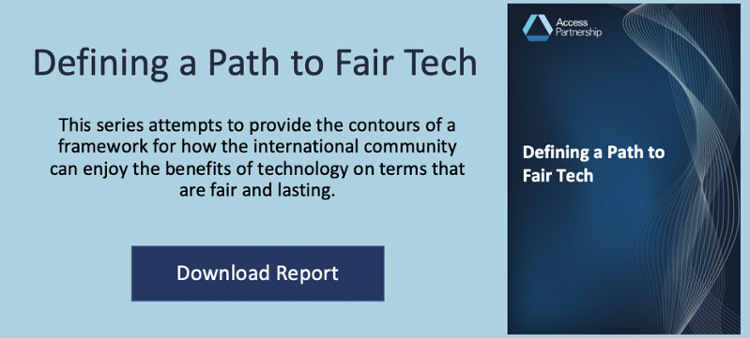Greg Francis
Managing Director
[email protected]
Fairness is not usual, it is not spread around equally despite a kinship to the notion of equity, it is no more lasting than physical beauty, and it cannot be defined out of context: you know it only when you see it, and by then it is often gone. Dynamic systems such as schoolyards, the Internet economy or human immunology are not conducive environments, and this means the technology sector has to work a little bit harder to do what is fair.
The reach for fairness by the tech sector is less a matter of dispute than of route. Every company wants a fair (level) playing field, fair terms of trade, and for consumers to have a fair shot at using their offering to their best advantage. Equally, those policymakers with sufficient collective bargaining power seek to apply fairness measures to the purveyors of technology by regulating how they compete, how they announce their intentions, and how they keep their promises.
This series is not an exercise in political philosophy, but it may feel like a manifesto of sorts. It attempts to provide the contours of a framework for how the international community can enjoy the benefits of technology on terms that are fair and – an important consequence of fairness – terms that are lasting. This is in part achieved by explaining how the tech sector is perceived from all those who interact with it: an entire generation of policymakers has grown up fretting about the digital divide and its effect on the global economy without fully recognising that responsibility for bridging it lay as much with governments as with their citizens and those companies in whom they are in direct and cringingly intimate relationships. When I know as much about you as you know about yourself, we have equal knowledge of you. If only I have the power to turn that knowledge to major advantage we have something else, but it is not fairness, and the consumer will not appreciate it.
Neither is this series a covert screed against Facebook or Weibo; Facebook does more to enable connectivity to the most remote citizen, and more to help that lonely person obtain information and provide content to the world than it has ever taken credit for. Real fairness needs constructing across a number of sturdy plinths described by how accessible technology is made, how easy it is to obtain and manipulate, and how unbiased its applications are. Whether a company provides hardware or AI services, the terms on which that is done in every market need to be lasting. In this regard, two basic scenarios suggest themselves.
Route 1: Tech-lash 2.0
Unless you are a blinkered ideologue, the present circumstance is plain to see. The technology sector is not trusted, and it is being challenged and regulated across the world in every jurisdiction (we may see this change as communications and medical technology enable the virus-beset global economy from falling off a ledge). A sampling of some of the reactions that governments have indulged in over the past 12 months include: statutes defining fake news over-broadly, Internet-balkanising “Sovereignty Laws”, and deep thinking around what constitutes truly national data (think about that one!). From these indicators, it is clear to see that the technology sector – from smartphone manufacturers to corporate cloud providers – will be subjected to an ever-changing regulatory landscape that will take just about all the predictability and economies of scale out of life. The logical response to this, which requires each company to make a separate accommodation in each market, will effectively require every national government to develop highly-evolved regulators that can address challenges from data privacy to software bias to online child protection. And the cost of building such regulatory capabilities will need to be recovered somewhere. So while a piecemeal approach does allow companies to act in their own time and suggest accommodations they can live up to, it does little for global fairness. Today, the regulatory deal I get from Singapore will be less permissive than that which I negotiate with Uganda. There is little fairness in that, and the arbitrage will not last for long.
Route 2: Very Collective Bargaining Power
The future is also possible to see if you look at the trend data. Governments started several years ago to manage aspects of the tech economy through collaboration and harmonised action. The number of multilateral and joint initiatives are too many to name here (though the Carnegie Endowment has done an excellent job at developing a compendium). Worthy spokespeople for the technology sector have also called for more government regulation, harmonised, they hope, to address in a single framework many of the perverse effects their excellent technologies have visited upon us.
These efforts demand an initiative to reconcile the aims of the two groups advocating for them: (1) governments that seek to reconcile the need for control with finding the fastest route to access the technologies and (2) companies that seek a route to market with stable and transparent rules that restore trust in the services they provide by being available on terms that are fair. There are two pre-conditions for the success of such a framework. First, industry must have adequate terms of engagement for the process to arrive at outcomes that are economically practicable and business friendly. Second, governments must retain the ability to engage with the process on terms consistent with their sovereign prerogatives.
Where to get this done? The institution that will be important for its convening power. And to that extent, there are a several multilateral entities that are strong candidates. With an eye for the most effective and efficient solution for establishing fairness to the terms by which technology is made available and can be used as a tool of macroeconomic growth, Access Partnership is engaging with the most effective candidate institutions and will have found the optimal home for such an initiative this year.
Conclusion
Any major undertaking must begin with an understanding of the challenges that need to be solved and the expectations of the stakeholders. In the rest of this series, Access Partnership’s worldwide leadership have polled their peers in government, civil society and industry to provide a clear picture of each stakeholder’s point of departure as we consider how to create a lasting equilibrium among them. We hope you will challenge our thinking and accompany us on this rewarding journey.






